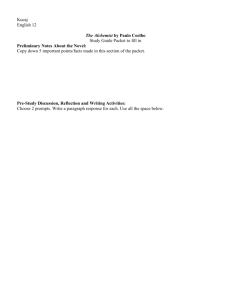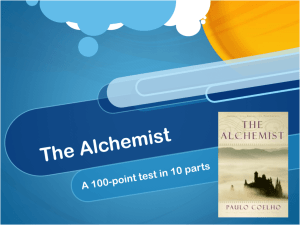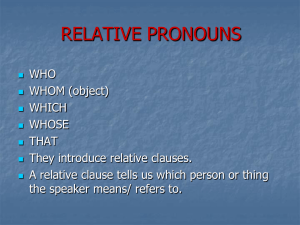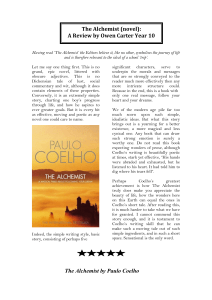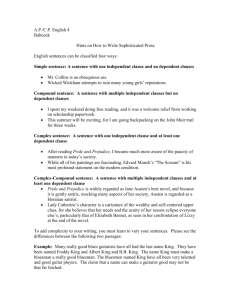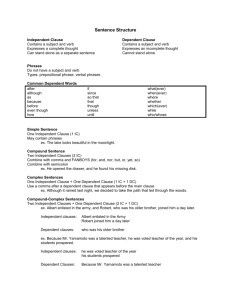Defining, non-defining and reduced relative clauses
advertisement
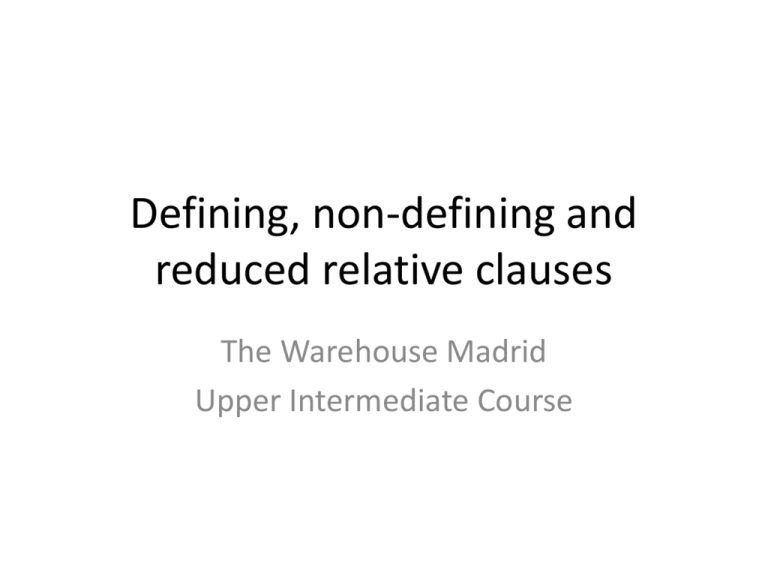
Defining, non-defining and reduced relative clauses The Warehouse Madrid Upper Intermediate Course What are defining relative clauses? • They tell you which person, thing, etc. the writer or speaker is talking about • The granddaughter, Alba Trueba, finds some diaries that her grandmother Clara wrote 50 years earlier. • John works at a shop that was once owned by Benjamin Franklin. Who (or that) for people • People that (who) die early in the story often appear as ghosts. • Students who (that) study a lot usually have better grades. That (or which) for things One Hundred Years of Solitude is the novel that (which) made magical realism popular around the world. Her story of triumph over illness is one of the few books which really inspires you. Whose for possessives • It tells the story of three generations of women whose lives are changed by their country’s politics. Where for places • This is a place where supernatural happenings ea part of everyday life. When for times • The story takes place at a time when political groups are battling for control of the country. NO Commas! • NO commas when we use defining relative clauses. Sometimes, we can omit… • Who, that or which (when the words aren’t the subject of the defining relative clause) • It’s the novel that made magical realism popular around the world. – WE CANNOT OMIT THAT because THAT is the subject of the relative clause • She finds some diaries (that) her grandmother Clara wrote 50 years earlier. – As grandmother is the subject and that is the object of the clause, in this case, we CAN omit it. Don’t forget WHOSE • We always need it in a defining relative clause. We can usually leave out where… • If we add a preposition at the end of the relative clause. – That’s the house where I was born. – That’s the house I was born in. What do non-defining relative clauses do? • Add extra non-essential information – It tells the story of seven generations of the Buendía family, who live in an isolated South American village called Macondo. In non-defining relative clauses… • There’s no “that” • We can’t leave out “who”, “which”, “whose”, etc. • We MUST use commas with non-defining relative clauses. Who or which can refer to a whole clause • The book has dozens of characters, which can make the plot difficult to follow. – “which” refers to the fact that the book has dozens of characters Reduced Relative Clauses • When a defining relative clause contains… – A continuous or passive verb form – We can often leave out… » Who » That » Which » And the auxiliary • Everyone (who is) living in the village suffers from both insomnia and amnesia. • The first novel (that was) written by the Chilean author Isabel Allende The Alchemist • The Alchemist by the Brazilian author Paulo Coelho is a story about following your dream. It’s about a shepherd boy named Santiago, who travels from his home in Spain to Egypt hoping to find some treasure that (which) is buried near the pyramids. He meets many people that (who) are travelling along the same road, but nobody knows where the treasure is hidden. However, Santiago eventually meets the famous Alchemist, the only man alive who (that) can turn lead into gold. The Alchemist • Finally, the time comes when Santiago realizes that the treasure that (which) he’s been looking for can only be found within himself. This powerful tale, which has been translated into 61 languages, has sold over 30 million copies worldwide. Its success helped Paulo Coelho, whose other books include the Fifth Mountain and the Valkyries, to become the best-selling Brazilian author who (that) has ever lived. #7 1. Yesterday I met a man who owned a bookshop. 2. This is the room where I wrote my first novel. 1. This is the room I wrote my first novel in. 3. Clive McCarthy, who writes biographies, was my English teacher. 1. Clive McCarthy, who was my English teacher, writes biographies. 4. That’s the woman whose first novel became a best-seller. 5. I threw out some paperbacks that (which) I hadn’t looked at in years. #7 6. I lost my copy of The Alchemist which had been signed by the author. 7. I found some old books which were hidden behind a cupboard.
